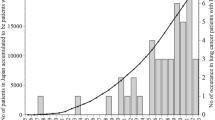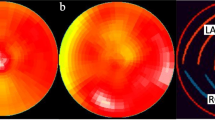Abstract
While antiretroviral therapy has improved mortality in patients with human immunodeficiency virus (HIV) infections, deaths caused by non-acquired immunodeficiency syndrome-defining malignancies are increasing. A woman in her 70s with HIV infection who was receiving antiretroviral therapy presented with dysphagia. She was diagnosed with esophageal cancer (cT3N2M0, stage III). She received neoadjuvant chemotherapy (cisplatin and 5-fluorouracil) and radiotherapy. During treatment, we continued administering antiretroviral therapy and prophylaxis for opportunistic infections, with due attention to side effects and drug–drug interactions. No severe adverse events occurred. The primary lesion and metastatic lymph nodes decreased in size after treatment; however, 1 month later, her cancer spread to other organs; thus, surgery was canceled. Her general condition rapidly worsened. She eventually died of cancer cachexia and aspiration pneumonia. No previous reports have mentioned the treatment plan and management of esophageal cancer in HIV-positive patients. This report presents a case of esophageal cancer with HIV infection that progressed rapidly after neoadjuvant chemoradiotherapy.


Similar content being viewed by others
References
Long JL, Engels EA, Moore RD, et al. Incidence and outcomes of malignancy in the HAART era in an urban cohort of HIV-infected individuals. AIDS. 2008;22:489–96.
Ando N, Kato H, Igaki H, et al. A randomized trial comparing postoperative adjuvant chemotherapy with cisplatin and 5-fluorouracil versus preoperative chemotherapy for localized advanced squamous cell carcinoma of the thoracic esophagus (JCOG9907). Ann Surg Oncol. 2012;19:68–74.
Kato K, Muro K, Minashi K, et al. Phase II study of chemoradiotherapy with 5-fluorouracil and cisplatin for stage II-III esophageal squamous cell carcinoma: JCOG trial (JCOG 9906). Int J Radiat Oncol Biol Phys. 2011;81:684–90.
Yanik EL, Katki HA, Engels EA. Cancer risk among the HIV-infected elderly in the United States. AIDS. 2016;30:1663–8.
Suneja G, Shiels MS, Angulo R, et al. Cancer treatment disparities in HIV-infected individuals in the United States. J Clin Oncol. 2014;32:2344–50.
Xia XJ, Liu BC, Su JS, et al. Preoperative CD4 count or CD4/CD8 ratio as a useful indicator for postoperative sepsis in HIV-infected patients undergoing abdominal operations. J Surg Res. 2012;174:e25–30.
Albaran RG, Webber J, Steffes CP. CD4 cell counts as a prognostic factor of major abdominal surgery in patients infected with the human immunodeficiency virus. Arch Surg. 1998;133:626–31.
Su J, Tsun A, Zhang L, et al. Preoperative risk factors influencing the incidence of postoperative sepsis in human immunodeficiency virus-infected patients: a retrospective cohort study. World J Surg. 2013;37:774–9.
Spano JP, Costagliola D, Katlama C, et al. AIDS-related malignancies: state of the art and therapeutic challenges. J Clin Oncol. 2008;26:4834–42.
Antinori A, Clingolani A, Alba L, et al. Better response to chemotherapy and prolonged survival therapy in AIDS-related lymphomas responding to highly active antiretroviral therapy. AIDS. 2001;15:1483–91.
Lavole A, Chouaid C, Baudrin L, et al. Effect of highly active antiretroviral therapy on survival of HIV-infected patients with non-small-cell lung cancer. Lung Cancer. 2009;65:345–50.
Navarro JT, Ribera JM, Oriol A, et al. Favorable impact of virological response to highly active antiretroviral therapy on survival in patients with AIDS-related lymphoma. Leuk Lymphoma. 2002;43:1837–42.
Moltó J, Rajoli R, Back D, et al. Use of a physiologically based pharmacokinetic model to simulate drug-drug interactions between antineoplastic and antiretroviral drugs. J Antimicrob Chemother. 2017;72:805–11.
Berretta M, Lleshi A, Cappellani A, et al. Oxaliplatin based chemotherapy and concomitant highly active antiretroviral therapy in the treatment of 24 patients with colorectal cancer and HIV infection. Curr HIV Res. 2010;8:218–22.
Phakathi BP, Basson G, Karusseit VOL, et al. The effect of HIV infection on the surgical, chemo- and radiotherapy management of breast cancer. A prospective cohort study. Int J Surg. 2016;34:109–15.
Berretta M, Martellotta F, Simonelli C, et al. Cetuximab/targeted chemotherapy in an HIV-positive patient with metastatic colorectal cancer in the HAART era: a case report. J Chemother. 2007;19:343–6.
Kaminura T, Karasawa K, Hanyu N, et al. Acute advance effects of radiation therapy on HIV-positive patients in Japan: study of 31 cases at Tokyo Metropolitan Komagome Hospital. J Radiat Res. 2010;51:749–53.
Fraunholz I, Rabeneck D, Gerstein J, et al. Concurrent chemoradiotherapy with 5-fluorouracil and mitomycin C for anal carcinoma: are there difference between HIV-positive and HIV-negative patients in the era of highly active antiretroviral therapy? Radiother Oncol. 2011;98:99–104.
Oehler-Jänn C, Huguet F, Provencher S, et al. HIV-specific differences in outcome of squamous cell carcinoma of the anal canal: a multicentric cohort study of HIV-positive patients receiving highly active antiretroviral therapy. J Clin Oncol. 2008;26:2550–7.
Fraunholz IB, Haberl A, Klauke S, et al. Long-term effects of chemoradiotherapy for anal cancer in patients with HIV infection: oncological outcomes, immunological status, and the clinical course of the HIV disease. Dis Colon Rectum. 2014;57:423–31.
Wexler A, Berson AM, Goldstone SE, et al. Invasive anal squamous-cell carcinoma in the HIV-positive patient: outcome in the era of highly active antiretroviral therapy. Dis Colon Rectum. 2008;51:73–81.
Rubinstein PG, Aboulafia DM, Zloza A. Malignancies in HIV/AIDS: from epidemiology to therapeutic challenges. AIDS. 2014;28:453–65.
Moses AV, Williams S, Heneveld ML, et al. Human immunodeficiency virus infection of bone marrow endothelium reduces induction of stromal hematopoietic growth factors. Blood. 1996;87:919–25.
Torres HA, Mulanovich V. Management of HIV infection in patients with cancer receiving chemotherapy. Clin Infect Dis. 2014;59:106–14.
Rudek MA, Flexner C, Ambinder RF. Use of antineoplastic agents in patients with cancer who have HIV/AIDS. Lancet Oncol. 2011;12:905–12.
Author information
Authors and Affiliations
Corresponding author
Ethics declarations
Conflict of interest
The authors declare no conflicts of interest in association with the present study.
Human/animal rights
All the procedures followed were performed in accordance with the ethical standards laid down in the 1964 Declaration of Helsinki and its later amendments.
Informed consent
Informed consent was obtained from the patient prior to treatment.
Additional information
Publisher's Note
Springer Nature remains neutral with regard to jurisdictional claims in published maps and institutional affiliations.
Rights and permissions
About this article
Cite this article
Hayakawa, Y., Kobayashi, K., Sakamoto, N. et al. A case of esophageal cancer with human immunodeficiency virus infection that progressed rapidly after neoadjuvant chemoradiotherapy. Clin J Gastroenterol 13, 17–21 (2020). https://doi.org/10.1007/s12328-019-01028-z
Received:
Accepted:
Published:
Issue Date:
DOI: https://doi.org/10.1007/s12328-019-01028-z




